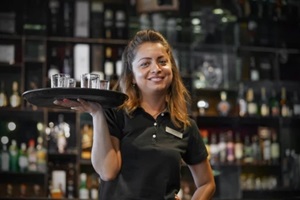 Running a bar can be a complex endeavor. A lively social moment where alcohol consumption is involved can quickly become an unprecedented liability, resulting in legal problems, bodily harm, or property damage.
Running a bar can be a complex endeavor. A lively social moment where alcohol consumption is involved can quickly become an unprecedented liability, resulting in legal problems, bodily harm, or property damage.
A bar insurance policy is required to safeguard the bar patrons and the business.
Understanding the Risks of Alcohol-Related Incidents
Hosting enjoyment and alcohol together within a bar establishment carries many risk factors for the business. Legal liabilities may arise from incidents related to over-consumption, serving alcohol to an already intoxicated person or a minor, or bar fights.
For example, in some jurisdictions, dram shop laws hold bars or patrons liable if, after serving a person with an addiction or a minor, the customer later causes an accident at the establishment. These risks can lead to lawsuits, resulting in expensive settlements.
Property damage also represents a significant concern, as unruly behavior influenced by intoxication can result in the destruction of valuable assets within the establishment.
One other important risk factor is personal injury — be it to employees, patrons, or third parties. Accidents resulting from impaired coordination and judgment can lead to substantial claims.
Protecting Your Bar From Legal Liabilities
The regulations governing alcohol service and consumption vary widely across different municipalities and states. Bar operators must be intimately aware of the legal framework within their area of operations.
Additionally, they should consider engaging legal experts specializing in liquor liability. These professionals can provide insights into the most current legal precedents and changes in the pertinent laws.
A primary focus area should be acquiring the proper permits and licensing, which come with strict compliance requirements. For example, state laws mandate the completion of a server training course.
Also, all employees should be trained on relevant laws and regulations and the bar’s policies and protocols meant to ensure compliance and safety within the establishment.
Obtaining Adequate Bar Insurance Coverage
An effective insurance policy can safeguard a bar against the financial fallout from alcohol-related incidents. Below are common types of coverage that may be required:
 Liquor Liability Insurance: This coverage insulates establishments that serve alcohol from the risks associated with this line of business. The policy covers legal costs and damages.
Liquor Liability Insurance: This coverage insulates establishments that serve alcohol from the risks associated with this line of business. The policy covers legal costs and damages.- General Liability Insurance: This is usually a fundamental policy for any business. It broadens the coverage to include claims against the company for bodily injury, associated medical costs, and damage to other third-party property.
- Property Insurance: This covers damage to the establishment’s physical structure and contents.
Factors to Consider When Selecting a Bar Insurance Policy
When it comes to selecting insurance for a bar, multiple factors come into play, such as:
Coverage Limits and Exclusions
Coverage limits are the various financial caps for different types of incidents within a policy. Ensuring these align with the risks the bar faces regularly is essential.
Exclusions are the scenarios explicitly not covered by an insurance policy. Scrutinizing these is equally important, as it may highlight areas where supplemental coverage is necessary.
Customizing the Policy to Suit the Bar
Every bar has a unique atmosphere and clientele; the chosen insurance policy should reflect that. Customizing the procedure will give the insurer a detailed understanding of bar operations, historical claims data, and unique selling points that could affect the business’ risk profile.
For instance, a bar may include an outdoor patio, susceptible to slip-and-fall incidents. Another bar may offer live music, requiring additional liability coverage for performers.
Working With a Reliable Bar Insurance Provider
Most importantly, bar owners and managers should work with a reliable insurance provider experienced in catering to bars and restaurants.
Proactive Risk Management Strategies
Note that insurance is a statistics-driven industry. If proactive measures are implemented, the likelihood of incidents is reduced. Consequently, insurance can be more affordable.
A comprehensive risk management strategy involves several proactive steps that decrease the probability and impact of alcohol-related incidents. These include:
Creating a Safe Environment
The management should create a safe environment by training its staff to identify and handle incidents. Also, the establishment should be well-lit with clear signage indicating age restrictions and policies against over-consumption.
Curb Alcohol Over-Consumption
Adequate controls must also be in place to curb over-serving alcohol. These may include limiting the number of drinks sold to an individual or requesting identification from visibly intoxicated customers.
Staff Training and Education
 Despite the most stringent policies, incidents can occur. How the bar staff reacts in the immediate aftermath is essential.
Despite the most stringent policies, incidents can occur. How the bar staff reacts in the immediate aftermath is essential.
They should be trained on proper incident response protocols, such as notifying management immediately, gathering relevant information from all parties involved, and coordinating with the police if necessary.
Get Comprehensive Bar Insurance: Contact Pro Insurance Group
Pro Insurance Group provides comprehensive coverage for bars and similar establishments across the U.S. Its agents are well-versed in the specific needs of liquor-serving establishments.
They can tailor an insurance package that offers a range against all pressing risks. Contact Pro Insurance Group today for a personalized bar insurance policy.
